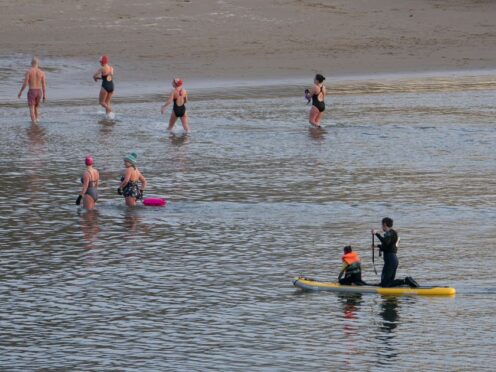Researchers are recruiting wild swimmers, surfers and paddlers to participate in studies focused on protecting people from pollution health risks.
University of Exeter scientists are working on the Poo-Stick project for wild swimmers in rivers and the BlueAdapt scheme for those who go in the sea.
UK waters are at risk from soaring levels of sewage and run-off pollution from farms – an issue that is being exacerbated by climate change.
Meanwhile, people across the country are increasingly using coastal and inland open waters recreationally.
Calling all Safer Seas and Rivers app users! The same @UniofExeter team that brought you the Beach Bums study is conducting a new study on our app, and would like to hear from you. Take part here: https://t.co/QaaVBqctLQ #SeaUserHealthSurvey @BlueAdaptEu
— Surfers Against Sewage (@sascampaigns) July 8, 2024
Contact with contaminated natural waters can cause a range of issues including ear infections, skin rashes, respiratory illness, diarrhoea and stomach cramps.
It is also exposing people to bacteria which are becoming increasingly resistant to antibiotics, the researchers said.
The Poo-Sticks project, funded by the Natural Environment Research Council (NERC), is recruiting participants who regularly swim in UK rivers and lakes to discover how wild swimmers might acquire antibiotic-resistant bacteria, also known as superbugs.
The researchers said understanding how these bacteria enter human bodies is crucial for controlling their spread, adding that polluted freshwater environments could be a key source of the microbes, genes and contaminants that promote bacterial resistance.
They said participants will be asked to provide a faecal sample using a pre-paid postal kit and share information about their recent swimming activities, lifestyle and health.
The swimmers are also encouraged to invite non-swimmers of similar age and gender to take part so they can compare their responses to bacteria.
The team said it hopes to identify whether differences in people’s gut bacteria might be due to exposure to natural waters affected by pollution.
PhD student Elitsa Penkova, who is leading the project, said: “A lot of people carry antibiotic-resistant bacteria in their guts, yet they’re completely unaware of it.
“But if bacteria causing an infection are resistant to antibiotics, then the treatment won’t work, which may lead to more severe illness.
“This is a major issue, and we hope our findings will help inform strategies for reducing the spread of antimicrobial resistant bacteria.”
The BlueAdapt project, led by the universities of Exeter and Galway, is asking coastal water users who use pollution monitoring services – like the Surfers Against Sewage smartphone app and Safer Seas – to take part in an online survey which is open until the end of October.
The research, funded by Horizon Europe and UK Research and Innovation, aims to find out whether access to reliable real-time information about water quality has an impact on how swimmers behave and can reduce preventable illnesses.
Professor Will Gaze, from the University of Exeter’s European Centre for Environment and Human Health, said: “Our aim is to provide evidence that can inform decision-making to reduce risk to water users and inform change to safeguard our natural environment.
“This research is timely as we are seeing a steep increase in antibiotic-resistant infections and is of particular concern given the increased attention the quality of our river and coastal water is currently receiving.”
Swimmers can sign up to the studies at https://bit.ly/poo-sticks and https://blueadapt.eu/sea-user-health-survey.
